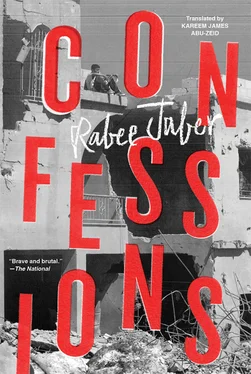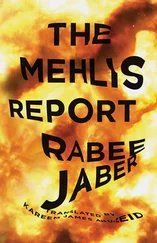I stopped taking the first medication, the one the pharmacist claimed wouldn’t have any side effects (I took out the little pamphlet and read about eleven different side effects. I counted them — they weren’t numbered on the pamphlet, but I counted them: there were eleven of them). I didn’t bleed out my ears after that. (One of Ilya’s friends was playing cards on the roof of our house after the Mountain War with his right ear and his right eye wrapped in bandages. He hadn’t been hit, but during one of the battles he’d fired a large number of RPG-7 rockets. His launcher had cracked and he knew it would explode on his shoulder if he fired it again. The flames had burned some bushes behind him and exposed his position. He found new cover and grabbed a launcher from a wounded friend. He fired that launcher till his ear started bleeding. He kept firing even after that. But he stopped when blood began streaming out of his right eye. His eye couldn’t stand the pressure.)
By the time the new semester started, my roommate had stopped sleeping in the room. He came every week or two to turn the room upside down looking for something or another, and then left. Sometimes I’d get back from my classes and see him with some friends from outside the university standing in front of our door — out on the wraparound balcony — jostling one another and shouting and laughing. They played children’s games together, which always surprised me. They’d form a circle with one of them in the middle, and then they’d hit the man in the middle on the back of his neck while he turned around and jumped and tried to protect his neck with his hands. The man in the middle’s task was to figure out who had last hit him: if he figured out who it was, he’d get to leave the center. They’d open up the circle whenever I approached, and I’d pass through and enter the room and throw my notebook on the bed before continuing to the bathroom. They always asked me to join them, and I never knew how to reply.
A few weeks later I discovered that I suddenly had a single room, that I’d been left alone there. My roommate had left the university without telling me. One of my neighbors from the other end of the fifth floor told me when I ran into him in the elevator. He said my roommate had gone back to his family in Jordan, and wouldn’t be returning. I waited another week before getting a cardboard box and putting all his clothes and books in it. I put the box under his bed and forgot about it. Did I forget? Whenever the Bangladeshi workers came to clean the room (sweeping and mopping), they complained about the box and started laughing. They put it up on the chair or on the table and kept on laughing. At that time in my life, people seemed to be smiling and laughing everywhere I looked. I even started running into the friends of my former roommate, who weren’t students from the university (one of them told me the name of the university where he was studying), whenever I crossed Bliss Street or rue Jeanne d’Arc, and they’d say hi and talk to me as if I were one of their closest friends. They’d laugh and slap me on the shoulder with their strong hands while I remembered how they used to stand in a circle in front of my room, in their brightly colored shirts (which were clean and ironed), a strong smell of perfume coming off of them. When I think back to them now and talk about them, I miss them — can you believe it? One of them always wore a yellow shirt and had a pair of those “Texas” boots that were so popular back then. He used to smack his hand against the boots. When he saw me taking some eggs out of the fridge to boil them, he’d laugh and say: “Nothing’s more important than eggs.” He’d crane his neck through the doorway as he stood outside with his friends and say that expression of his and laugh, and I’d laugh too.
Did I laugh? I painted different expressions on my face. It’s enough to depict the emotion, right? If you frown, the people around you think you’re sad. And if you smile, they think you’re happy. I used to paint expressions on my face. Now, when I talk about them and remember how they’d open up the circle and ask me to join in, I know that they too are part of my story (though I don’t know their names).
In the evening, I used to leave campus with Antoine or another one of my friends and go for a walk on the corniche. Sometimes I’d go by myself. I started preferring walks by myself — I could walk at the speed I wanted then, and if I wasn’t in the mood to talk, I wouldn’t be forced to talk. Back then, crowds used to throng the corniche at night: carts selling corn and fava beans and chestnuts and pistachios dotted the sidewalks, and people were celebrating every night of the week. There were lovers sitting on the guardrails, and cars drove by with their doors wide open and video cameras on their roofs. I got in the habit of walking in the other direction, away from those crowds. I’d walk from the lighthouse near the university toward the military baths. That stretch of the corniche was less crowded. I didn’t walk toward Ain al-Mreisseh.
I was following the doctor’s orders. I walked and listened to the sea. The waves crashed against the wall and their spray rose up above the guardrails. I felt the moisture on the side of my face. I changed my course slightly, moving away from the rails and the spray, and kept walking, until, at a certain point on the path, I saw the beam from the lighthouse up above, spinning and cutting through the black sky. The cars passed by while I turned around and went back the way I’d come. I went out and walked on the corniche every night. Sometimes I’d see young women from the university jogging in their sports clothes, with headphones on their ears and small Walkmen in their hands. One of them looked at me once as we passed each other. She was in one of my classes, and I only noticed her after she’d greeted me.
I mention that woman merely to say this: I was there, and others saw my face and recognized me, remembered me. I was there, but I wasn’t fully paying attention. That’s all.
Was it the walking that helped me, or the passing of time? The semester went on and I went to all my lectures (attendance is mandatory in engineering) and wrote everything down in my notebooks. One time I was in the big hall (its name was ELH) and the professor was writing something on the board that was related to the Second Law of Thermodynamics, and I noticed I wasn’t copying down what he’d written. I wasn’t writing down the symbols and equations, I wasn’t even writing in English. I looked down at the page and felt nervous (afraid?). The page was covered in ink. A single word in Arabic had been written over and over again in tiny handwriting (as if it weren’t my own), from the top of the page to the bottom: ismi (“my name”).
I got better in spite of this — I could feel myself getting better: I started seeing colors again, smells slowly came back to me, and sounds began reaching my ears. I slept at night. And I had dreams while I slept, some I’d remember, and some I’d forget. I’d see faces I knew and faces that were blurry, as if they were slipping away beyond the fog. The faces that slipped away disturbed me. But still I got better.
Final exams came round again, and this time they were easy. My friends said they were harder, but they were easier to me. I didn’t run into any difficulties in my sophomore year. I discovered I loved studying: I loved opening up a book and spending my night in an ordered world, a world with laws. Once you’ve grasped those laws, you can accomplish anything you want: you won’t run into any problems then. I loved studying, and I loved reading. I still enjoyed literature as well as science. I studied Sophocles and the Greek tragedies (an elective course) in my junior year. I remember the professor of that course. In the very first class, he asked us who believed in fate and who didn’t, and had us raise our hands while he counted them. That was quite an unusual thing to do: he seemed extremely interested in the subject.
Читать дальше












